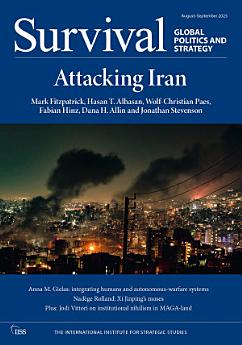Survival: August–September 2025
About this ebook
In this issue:
· Following US and Israeli airstrikes, Mark Fitzpatrick assesses Iran’s residual nuclear capabilities, its freshly intensified resentment and its perceived need to defensively arm itself
· Anna M. Gielas argues that humans must be kept actively engaged in artificial-intelligence interfaces used in autonomous warfare to preserve human discretion and cognitive readiness to intervene
· Ramon Pacheco Pardo judges that Yoon Suk-yeol’s December 2024 declaration of martial law ultimately served to underscore the resilience of South Korean democracy
· Dana H. Allin and Jonathan Stevenson examine the windows of opportunity that precipitated Israel’s strikes on Iran: Israel’s current strategic superiority and a US president disinclined to prevent Israeli action
· And nine other thought-provoking pieces, as well as our regular Book Reviews and Noteworthy column.
To read free articles from the journal, please visit its homepage at https://www.tandfonline.com/journals/tsur20.
Editor: Dr Dana Allin
Managing Editor: Jonathan Stevenson
Associate Editor: Carolyn West
Editorial Assistant: Anna Gallagher
About the author
The International Institute for Strategic Studies (IISS), a registered charity with offices in Washington, London, Manama, Singapore and Berlin, is the world’s leading authority on political–military conflict. It is the primary independent source of accurate, objective information on international strategic issues. Publications include The Military Balance, an annual reference work on each nation’s defence capabilities; The Armed Conflict Survey, an annual review of the world’s active conflicts; Survival, a bimonthly journal on international affairs; Strategic Comments, an online analysis of topical issues in international affairs; and the Adelphi series of books on issues of international security.







